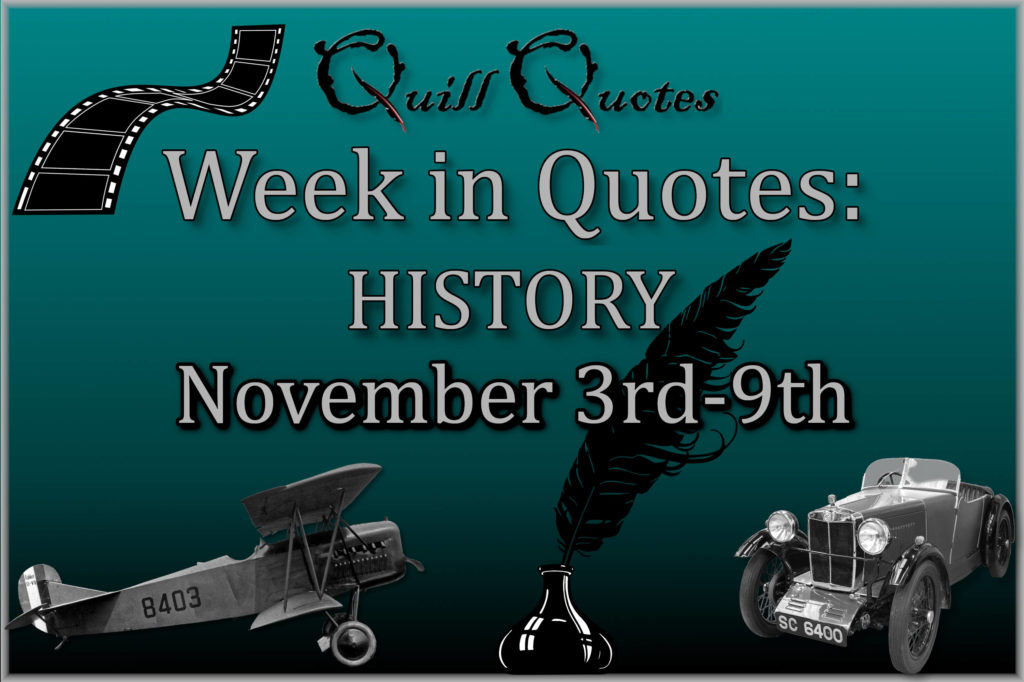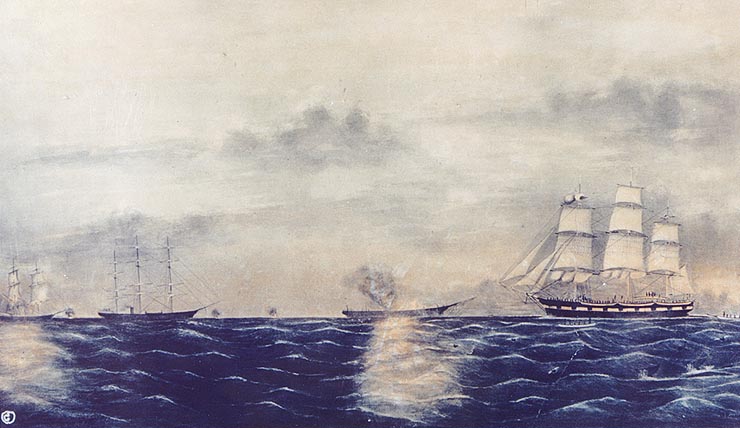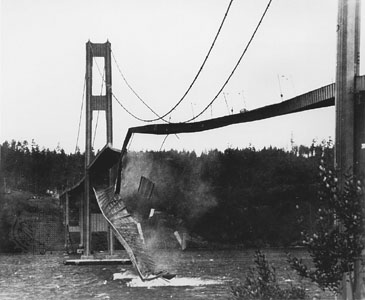There is always much to learn from quotes and their historical significance. Read on for a collection of quotes and general history from November 3rd – 9th.

November 3, 1906
“· · · – – – · · ·”
– SOS distress signal
On November 3, 1906, the SOS distress signal became the worldwide signal for help at the first International Radiotelegraph Convention held in Berlin, Germany. However, the convention only specified the signal as an unbroke sequence of three dots, three dashes, three dots. The translation to SOS in International Morse Code was only adopted after the convention as an easy way to remember the code, often associated with “Save Our Souls” or “Save Our Ship”. Another benefit of SOS is that it’s an ambigram, reading the same right side up as upside down, aiding visual recognition. The SOS distress signal continues to be used today and the phrase “SOS” has become synonymous with “crisis” and “help”.
November 4, 1979
“We have taught Iran’s leaders and the world a very bad lesson: that there is a price on the head of Americans to be held hostage.”
– Tom Cotton
The Iran hostage crisis began on November 4, 1979, when Iranian college students seized the U.S. Embassy in Tehran capturing 52 Americans. With Iranian Revolution leader Ayatollah Ruhollah Khomeini supporting the takeover, the students’ protest became much more than they’d originally planned. Negotiations by U.S. President Jimmy Carter were largely unsuccessful and an attempted rescue by the U.S. military, Operation Eagle Claw, also failed. Eventually, Iraq’s invasion starting the Iran-Iraq War restarted negotiations with the U.S. and the Algiers Accords agreement was finally reached. After 444 days, the hostages were released on January 20, 1981, just minutes after Ronald Reagan was sworn in as president.
November 5, 1605
Remember, remember, the 5th of November
The Gunpowder Treason and Plot;
I know of no reason why the Gunpowder Treason
Should ever be forgot.
Guy Fawkes, Guy Fawkes,
‘Twas his intent.
To blow up the King and the Parliament.
Three score barrels of powder below.
Poor old England to overthrow.
November 5th has been known as Guy Fawkes Night ever since the failed Gunpowder Plot of 1605. The annual event is celebrated with bonfires and fireworks, particularly in the United Kingdom. The tradition began when Guy Fawkes was arrested while guarding explosives placed under the House of Lords intended to kill King James I. In celebration of their King’s survival, people lit bonfires all around London. Although 12 others were involved in the plot, Fawkes has become the most widely known. For example, the Guy Fawkes mask, used in V for Vendetta, is now a well-known symbol for anti-government protests.

Fun fact, the word “guy”, as in “hey, you guys”, can be traced back to Guy Fawkes’ name! Originating as the word for the human likenesses burned on the bonfires often dressed as Fawkes. “Guy” later came to refer to someone dressed funny, and today, at least in American English, to a male person or any group of people.
November 6, 1865
“November 5 – Arrived in the Mersey, off Liverpool, and on Monday, the 6th, surrendered the Shenandoah to the British nation, by letter to Lord John Russell, premier of Great Britain.”
– James I Waddell
On November 6, 1865, the last remaining Confederate combat unit, the CSS Shenandoah, surrendered on the River Mersey, Liverpool, UK, six months after the American Civil War ended. As one of the most feared Confederate commerce raiders, the CSS Shenandoah sank or bonded 38 merchant vessels on its mission to disrupt the Union economy. Mostly targeting whaling ships, following them around the world made the Shenandoah the only Confederate warship to circumnavigate the globe. Upon learning of the war’s end, Captain James Waddell decided to surrender in the UK for fear of being tried as pirates in the US. A good decision, as captain and crew were all released after a short hold aboard the ship. Their surrender marked the last official lowering of the Confederate flag and the last act of the Civil War.

November 7, 1940
“The Tacoma Narrows bridge failure has given us invaluable information… It has shown [that] every new structure [that] projects into new fields of magnitude involves new problems for the solution of which neither theory nor practical experience furnish an adequate guide. It is then that we must rely largely on judgment and if, as a result, errors, or failures occur, we must accept them as a price for human progress.”
– Othmar Ammann
The Tacoma Narrows Bridge collapsed on November 7, 1940, in one of the most famous non-fatal engineering disasters in history. During construction, completed only a few months earlier on July 1st, workers nicknamed the bridge Galloping Gertie for the vertical oscillations caused by the wind. Despite the vertical movement, the bridge was believed to be structurally sound and opened as planned. However, 40 mph (64 km/h) winds on the day of the collapse led to an unexpected twisting motion. The collapse was determined to be caused by winds producing aeroelastic flutter matching the bridge’s natural frequency. Today, the bridge’s collapse serves as a prime example of forced resonance, often presented in engineering and physics studies.

November 8, 1974
“I have had a traumatic night of unbelievable coincidence. However I won’t bore you with anything or involve you except to say that when you come across my children, which I hope you will, please tell them that you knew me and that all I cared about was them. The fact that a crooked solicitor and a rotten psychiatrist destroyed me between them will be of no importance to the children. I gave Bill Shand Kydd an account of what actually happened but judging by my last effort in court no-one, let alone a 67 year old judge – would believe – and I no longer care except that my children should be protected.”
– Lord Lucan
Richard John Bingham, commonly known as Lord Lucan, disappeared on November 8, 1974, after being suspected of murder. As a professional gambler, he was known for his expensive tastes and was once considered for the role of James Bond. However, his 1972 divorce from Veronica Duncan and mounting gambling losses dramatically impacted his lifestyle. After losing a bitter custody battle for their 3 children, Lord Lucan was the prime suspect when Sandra Rivett, the children’s nanny, was bludgeoned to death and Lady Lucan attacked in their family home on November 7, 1974. A warrant was issued for his arrest, but Lucan was never found. Although there have been many reported sightings around the world, none have been substantiated and Lord Lucan was officially declared dead in 2016, passing the title to his son, George Bingham.
November 9, 1989
“After the Berlin Wall came down I visited that city and I will never forget it. The abandoned checkpoints. The sense of excitement about the future. The knowledge that a great continent was coming together. Healing those wounds of our history is the central story of the European Union.”
– David Cameron
The fall of the Berlin Wall occurred on November 9, 1989. Considered one of the most pivotal events in world history, it symbolized the falling of the Iron Curtain and lessening of tensions in the Cold War. Although the USSR wasn’t officially dissolved until December 26, 1991, the fall of the Berlin Wall is often associated with the end of the Cold War. Also significant to German history, the same date in 1918 marked the abdication of Kaiser Wilhelm II and declaration of the first German republic, the Weimar Republic. Unfortunately, the date is also marred by the Kristallnacht, or Night of Broken Glass, when violent riots broke out against Jews across Nazi Germany in 1938.

In case you missed last week’s quotes, see History October 27th – November 2nd.
To never miss a Quill Quotes post, please subscribe via email and/or follow us on social media!
Leave a Reply